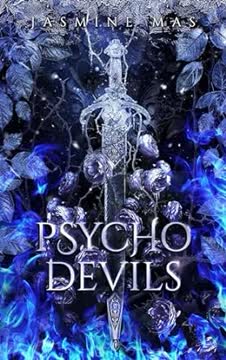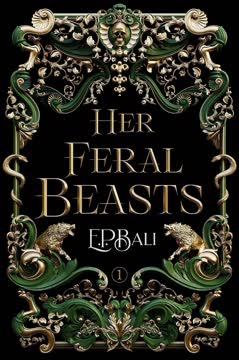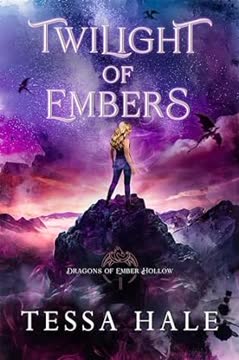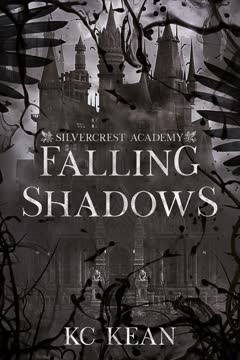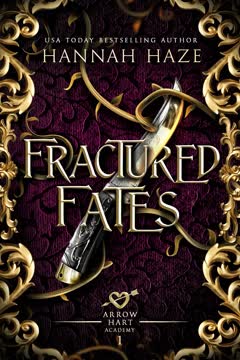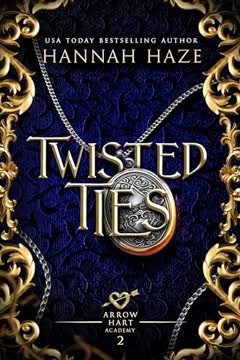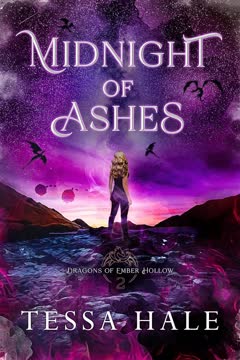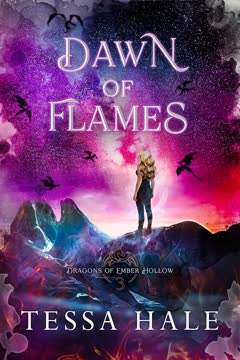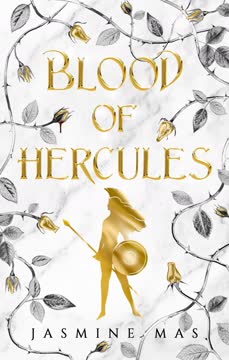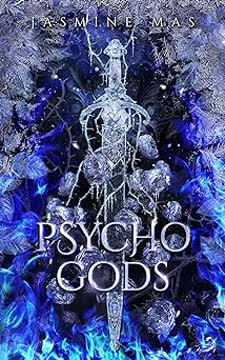Plot Summary
Shackles and Revelations
The story opens with Corvus Malum and his devil mates, Scorpius and Orion, returning to Elite Academy, only to find themselves magically bound to Aran—who is revealed to be Arabella, a fae woman in disguise. The devils, kings of their kind, are furious at being shackled to someone they see as weak and deceitful. The bond is enforced by a slave tattoo, and the group's dynamic is instantly poisoned by betrayal, anger, and the loss of their mating song—a supernatural connection that once united the devils. Arabella, exhausted and traumatized, is forced into proximity with the devils, who oscillate between rage and obsession. The stage is set for a brutal, psychological war of wills, with trust shattered and survival uncertain.
The Slave Bond
The slave tattoo is more than a magical shackle—it enforces proximity, inflicts pain if Arabella tries to leave, and warps the emotions of all involved, making the devils irrationally possessive and protective. Arabella is forced to remain with her tormentors, who are themselves tormented by the incomplete mate bond and the tattoo's side effects. The devils' sadism and Arabella's defiance escalate, with threats, violence, and sexual tension simmering beneath every interaction. Meanwhile, the political machinations of Lothaire, Arabella's vampyre father, and the High Court's manipulations ensure that none of the characters can escape their fates.
Party of Monsters
The academy is a den of monsters—devils, demons, shifters, and more—each with their own agendas and traumas. Arabella, still reeling from her exposure and enslavement, is thrust into a world of parties, sexual games, and deadly competitions. The devils' cruelty is matched only by their obsession with her, and Arabella's only solace comes from her best friend John, whose loyalty and humor are a lifeline. The lines between pleasure and pain, love and hate, blur as the characters test each other's limits, and the academy's true nature as a training ground for war is revealed.
The Legionnaire Games Begin
The High Court announces the Legionnaire Games—a series of brutal, multi-realm competitions designed to forge the next generation of war leaders. Arabella and her legion (the devils, demons, John, and others) are forced to compete against other legions: angels, shifters, assassins, and leviathans. The games are not just physical but psychological, designed to break and remake the competitors. Each challenge is a test of loyalty, sacrifice, and the ability to endure suffering. Arabella, already battered, is repeatedly chosen for the most dangerous roles, her resilience and cunning tested to the limit.
Blood, Betrayal, and Survival
The games leave the competitors physically and emotionally shattered. After each challenge, the survivors must heal themselves with minimal resources, stitching wounds and tending to each other's broken bodies. Arabella's suffering is relentless—she is stabbed, burned, and forced into humiliating punishments. The devils, especially Corvus, begin to see her strength and tenacity, but their possessiveness and rage remain. The group's survival depends on their ability to work together, but old wounds and new betrayals threaten to tear them apart.
The Price of Loyalty
Arabella's only true friend is John, whose unwavering support is a rare comfort. Their bond is tested when the gods force them into a public sexual punishment as part of the games, a moment that is both traumatic and transformative. The devils' jealousy and possessiveness reach new heights, and Arabella is forced to confront the reality that no one—not even her friends—can protect her from the gods' cruelty. The cost of loyalty is high, and every character is forced to choose between self-preservation and sacrifice.
The Games: Pain and Power
As the games progress, the challenges become more sadistic and the psychological toll mounts. Arabella's resilience is pushed to the breaking point, but she refuses to give in. The devils, demons, and John begin to see her not as a burden but as a leader in her own right. The group's dynamic shifts as Arabella's intelligence and courage become essential to their survival. The games are a crucible, forging new alliances and exposing old wounds.
The Storm and the Glass
A supernatural storm descends on the academy, and the competitors are forced to survive a night of freezing winds and razor-sharp glass rain. Arabella, already wounded, sacrifices herself to protect a teammate, enduring hours of agony as she shields him from the storm. Her selflessness and pain become a turning point, both for her own transformation and for how others see her. The storm is both literal and metaphorical—a test of what each character is willing to endure for others.
The Fourth Mate
After a series of harrowing challenges, it is revealed that Arabella is not just a fae or a slave—she is the devils' missing fourth mate, their Revered, the heart of their soul bond. The realization is both a blessing and a curse: the devils are forced to confront their own cruelty and the ways they have failed her, while Arabella must decide whether to accept a bond with those who have hurt her. The mate bond is not just romantic or sexual—it is a metaphysical connection that brings both healing and new dangers.
Angel's Awakening
Arabella's true nature is revealed: she is not fae, but an angel, the daughter of a powerful and infamous mother. Her powers, long suppressed, awaken in a moment of ultimate sacrifice as she saves a child from the devils' judgment. Wings erupt from her back, and she is inducted into the Angel Consciousness—a collective mind that guides and controls her kind. The revelation changes everything: Arabella is now both a weapon and a target, her destiny entwined with the fate of the realms.
Judgment and Sacrifice
The devils, now fully aware of Arabella's importance, are forced to confront their own darkness. Their powers—fire, judgment, and song—are revealed to be tools of both creation and destruction. In a climactic moment, they are ordered to execute a child for her supposed sins, but Arabella intervenes, sacrificing herself to save the girl. Her act of selflessness earns her wings and cements her role as both a leader and a martyr. The devils, shamed and awed, must reckon with the consequences of their actions.
The Showcase: Wings Unfurled
The final challenge is a showcase of power and unity. Arabella, now an angel with wings, leads her legion alongside the shifters, proving their worth to the gods. The games are revealed to be a prelude to war against the ungodly, a monstrous species threatening all realms. Arabella's leadership, compassion, and willingness to sacrifice herself for others are recognized, and her legion is named one of the champions who will lead the coming war. The devils, demons, and twins must now unite under her banner.
The Aftermath of War
The games are over, but the scars remain. Arabella and her allies are physically and emotionally battered, haunted by the horrors they have endured and the choices they have made. The devils, now repentant, seek forgiveness and a place in Arabella's life, but she is wary of their intentions. The twins, John and Luka, propose a betrothal, offering her a new kind of partnership based on love and respect. Arabella, for the first time, is able to choose her own path.
Scars and Forgiveness
Arabella's past—her mother's abuse, the slur carved into her back, the betrayals of those she trusted—cannot be erased. The devils, especially Corvus, are forced to confront the ways they have hurt her and to seek forgiveness not just from her, but from themselves. Arabella, scarred but unbroken, must decide whether to accept their apologies and the mate bond, or to forge a new destiny with the twins. Healing is slow, and forgiveness is not guaranteed.
Betrothal and Defiance
In a moment of defiance, Arabella accepts the twins' proposal, choosing a partnership based on mutual respect and affection rather than destiny or obligation. The devils are furious, unable to accept her rejection, but Arabella stands firm. The mate bond, once a shackle, is now a choice—and she chooses freedom. The twins' love is a balm, and together they begin to build a new future, even as the threat of war looms.
The War Room
With the games concluded, Arabella and her allies are summoned to the High Court's war room. The reality of the coming conflict is laid bare: the ungodly are spreading, and the champions must lead the realms in a desperate fight for survival. The war will demand everything—sacrifice, cunning, and unity. Arabella, once a victim, is now a general, her scars a testament to her strength. The devils, demons, shifters, and twins must put aside old grievances and work together, or all will be lost.
The Meaning of Power
In the aftermath, Arabella reflects on the meaning of power, leadership, and love. The games have forged her into a leader, but at a terrible cost. The devils, once monsters, are now humbled and seeking redemption. The twins, once friends, are now partners. The scars—physical and emotional—remain, but so does hope. The war is coming, but for the first time, Arabella is not alone. She has chosen her family, and together, they will face whatever comes next.
Characters
Arabella (Aran)
Arabella, known as Aran while in disguise, is the protagonist—a fae queen hiding as a boy to survive. Traumatized by her mother's abuse and the slur carved into her back, she is fiercely intelligent, sarcastic, and resilient. Her relationships are fraught: she is enslaved to the devils, tormented by their cruelty, yet ultimately revealed to be their missing mate, the Revered. Arabella's journey is one of suffering, sacrifice, and transformation. She is forced to confront her own darkness, accept her angelic heritage, and choose between destiny and self-determination. Her development is marked by a refusal to be defined by her scars, and a determination to protect others—even at great personal cost.
Corvus Malum
Corvus is the leader of the devil kings, an Ignis whose power is both a gift and a curse. Haunted by the deaths of his family and his inability to control his flames, he is obsessed with strength and control. His relationship with Arabella is fraught with rage, possessiveness, and eventual respect. Corvus's journey is one of reckoning: he must confront his own cruelty, seek forgiveness, and learn that true power lies in vulnerability and compassion. His devotion to his mates is absolute, but his inability to express it healthily is a source of constant pain.
Scorpius
Scorpius is the blind Protector of the devils, a sadomasochist whose cruelty masks deep wounds. Bullied for his blindness, he has learned to strike first and trust no one. His relationship with Arabella is antagonistic, but he is the first to recognize her suffering and the need to protect her. Scorpius's development is a slow journey toward empathy and self-acceptance. He is fiercely loyal to his mates, but his methods are often brutal. The revelation of Arabella's scars forces him to confront his own failings and seek redemption.
Orion
Orion is the Revered of the devils, the supposed heart of the mate bond. Outwardly gentle and beautiful, he harbors a deep obsession and a capacity for violence. His inability to speak is both a vulnerability and a source of power—his voice is literally enthralling. Orion's fixation on Arabella is both protective and possessive, and he struggles to reconcile his desire to care for her with his own darkness. The revelation that Arabella is the true Revered forces him to accept a new role as Protector and to confront the consequences of his actions.
John
John is Arabella's best friend and emotional lifeline. Loyal, funny, and supportive, he is the only person who consistently treats her with kindness and respect. His relationship with Arabella is tested by the gods' cruelty, but he remains steadfast. The revelation that he is one of the Princes of Darkness, and that he and his twin Luka are not fully human, adds new layers to his character. John's love for Arabella is both platonic and romantic, and his willingness to sacrifice for her is a testament to his strength.
Luka
Luka, John's twin, is the silent, brooding counterpart to his brother's easygoing nature. Often mistaken for John, he is revealed to be a separate person with his own traumas and loyalties. Luka's love for Arabella is fierce and protective, and his willingness to defy the gods for her marks him as a true partner. His development is one of emerging from the shadows and claiming his own place in Arabella's life.
Lothaire
Lothaire is Arabella's biological father, a vampyre with his own agenda. His attempts to protect Arabella are often misguided and result in further suffering. He is a pawn of the High Court, forced to enforce their will even as it destroys his daughter. Lothaire's relationship with Arabella is fraught with guilt, regret, and a desperate desire for forgiveness. He is both a victim and a perpetrator, and his development is marked by a slow realization of the consequences of his actions.
Sadie
Sadie is Arabella's best friend and a shifter queen in her own right. Fiercely loyal, irreverent, and powerful, she is a source of comfort and support. Her own traumas mirror Arabella's, and their friendship is a lifeline for both. Sadie's mates are protective and loving, and her ability to forgive and move on is a model for Arabella. Sadie's presence is a reminder that family is chosen, not given.
Jinx
Jinx is a mysterious, preternaturally intelligent child who serves as Arabella's guardian in the Angel Consciousness. Forced to masquerade as a child, she is in reality much older and more powerful. Jinx's own suffering is immense—she is tortured nightly and forced to manipulate those she loves. Her relationship with Arabella is complex: she is both protector and victim, and her actions are driven by desperation and a desire for redemption.
The High Court (Dick, Lyla, etc.)
The High Court is the shadowy power behind the games, the war, and the suffering of all the characters. Their representatives—Dick, Lyla, and others—are ruthless, pragmatic, and willing to sacrifice anyone for the greater good. They enforce the rules, manipulate the competitions, and ensure that no one escapes their control. Their presence is a constant reminder that the true enemy is not any one person, but the system itself.
Plot Devices
The Slave Tattoo
The slave tattoo is the central plot device that binds Arabella to the devils, forcing them into constant contact and warping their emotions. It is both a literal and metaphorical representation of trauma, control, and the loss of agency. The tattoo's side effects—irrational possessiveness, pain when separated, and the corruption of the mate bond—drive much of the conflict and character development.
The Legionnaire Games
The games are the narrative engine of the story, providing structure, stakes, and opportunities for character growth. Each challenge is designed to test not just physical strength, but psychological resilience, loyalty, and the willingness to sacrifice. The games are a crucible, exposing the characters' weaknesses and forcing them to confront their own darkness.
The Mate Bond
The mate bond is both a blessing and a curse. It promises unity, power, and healing, but also enforces roles, expectations, and the potential for abuse. The revelation that Arabella is the devils' missing mate, and the true Revered, is a turning point that forces all characters to confront their own desires and failings. The bond's corruption (bond sickness) is a metaphor for trauma and the need for reconciliation.
Angelic Heritage and Awakening
Arabella's true nature as an angel is a secret that shapes her entire journey. Her powers are suppressed by the High Court, and her awakening is triggered by acts of selflessness and sacrifice. The Angel Consciousness, the guardian system, and the process of earning wings are all devices that explore themes of destiny, control, and the cost of power.
Psychological Suffering and Healing
The story is saturated with depictions of trauma—physical, emotional, and psychological. The characters' suffering is both a source of strength and a barrier to healing. The process of stitching wounds, enduring pain, and seeking forgiveness is a recurring motif, symbolizing the slow, painful journey toward wholeness.
Narrative Structure and Perspective
The novel employs a shifting narrative structure, moving between Arabella, the devils, John, Luka, and others. The use of unreliable narration, time skips, and dissociation mirrors the characters' psychological states and heightens the sense of disorientation and trauma. The story's structure is itself a reflection of the chaos and fragmentation of the characters' lives.
Analysis
Psycho Devils is a dark, violent, and deeply psychological fantasy that interrogates the nature of power, trauma, and redemption. At its core, the novel is about survival—of the body, the mind, and the soul—in a world designed to break its inhabitants. Through the lens of Arabella's suffering and transformation, the story explores the costs of leadership, the dangers of unchecked power, and the possibility of healing through chosen family and self-determination. The mate bond, once a symbol of destiny and unity, is revealed to be both a shackle and a source of strength, depending on how it is wielded. The novel's unflinching depiction of abuse, self-harm, and psychological torment is balanced by moments of humor, love, and genuine connection. Ultimately, Psycho Devils is a meditation on the meaning of agency: the power to choose one's own path, to forgive (or not), and to find hope in the ashes of suffering. The war to come is both literal and metaphorical—a battle not just against external monsters, but against the darkness within.
Last updated:
FAQ
Synopsis & Basic Details
What is Psycho Devils about?
- A Fae Queen's Unveiling: Psycho Devils thrusts readers into the brutal world of Elite Academy, where Arabella, a fae queen in disguise, is exposed as Arabella, a woman. This revelation immediately binds her to three powerful devil kings—Corvus Malum, Scorpius, and Orion—through a magical slave tattoo, igniting a volatile dynamic of rage, possessiveness, and reluctant connection.
- Survival in a War-Forging Crucible: The story centers on Arabella's struggle for survival and self-determination as she is forced to compete in the sadistic Legionnaire Games, a series of psychological and physical challenges designed by the High Court to forge leaders for an impending inter-realm war against the monstrous Ungodly.
- Unraveling Identity and Destiny: Amidst escalating violence and emotional torment, Arabella grapples with her traumatic past, her true angelic heritage, and the complex, often contradictory, relationships with her devil captors and her loyal friends, John and Luka, as she navigates a path between predetermined fate and personal choice.
Why should I read Psycho Devils?
- Deep Psychological Exploration: Dive into a narrative rich with psychological complexity, exploring themes of trauma, dissociation, and the human (and supernatural) capacity for both cruelty and profound loyalty. Arabella's internal struggles and coping mechanisms offer a raw, unflinching look at survival.
- Unique Reverse Harem Dynamics: Experience a dark romance where the lines between captor and protector, love and obsession, are constantly blurred. The evolving relationships between Arabella and the devil kings, contrasted with her bond with the twins, John and Luka, offer a fresh, intense take on the reverse harem genre.
- Intriguing World-Building and Lore: Immerse yourself in a richly imagined universe of interconnected realms, ancient prophecies, and powerful species. The High Court's manipulative politics and the looming threat of the Ungodly provide a compelling backdrop for a story that subverts traditional fantasy tropes.
What is the background of Psycho Devils?
- Cosmic Political Landscape: The narrative unfolds within a vast "Shifterverse" where different planets, or realms, are connected by black holes (portals). A secret High Court, enforced by powerful "monsters," maintains "Realm-Wide Peace," but their methods are often ruthless and manipulative, setting the stage for macro-level deceptions and power struggles.
- Ancient Prophecies and Power Dynamics: The story is steeped in ancient texts and prophecies, particularly concerning mate bonds and the roles of powerful individuals. Devils, angels, fae, shifters, and other species exist within a rigid hierarchy, with "Ignises" (soul-fire wielders) and "Revereds" (creatures of extreme beauty and inherent goodness) holding pivotal roles in maintaining balance or unleashing chaos.
- The Looming Threat of the Ungodly: A critical background element is the impending inter-realm war against the "ungodly," a sentient species that has infested multiple realms. This existential threat drives the High Court's desperate measures, including the Legionnaire Games, to identify and train champions, highlighting the high stakes and moral ambiguities of the conflict.
What are the most memorable quotes in Psycho Devils?
- "I must get my soul back from you; I am killing my flesh without it.": This Sylvia Plath quote, featured in the Foreword, profoundly foreshadows Arabella's journey of self-discovery and her struggle to reclaim her identity and agency from the various forces (her mother, the devils, the High Court) that seek to control her soul and body.
- "Good does not balance evil in the realms; devil kings do.": Spoken by the sun god's representative, this quote defines the brutal, utilitarian philosophy of the devil kings and the High Court. It highlights their role as merciless enforcers of a harsh cosmic order, justifying their violence as a necessary evil for "Realm-Wide Peace."
- "The games douse legions in kerosene, And set their relationships on fire; The loyal few emerge stronger, Most die on the pyre.": This chilling quote from Lyla the Witch encapsulates the true nature of the Legionnaire Games. It emphasizes the psychological and relational destruction inherent in the competition, revealing it as a crucible designed to test and forge bonds through extreme suffering, rather than just physical prowess.
What writing style, narrative choices, and literary techniques does Jasmine Mas use?
- Visceral and Sensory Prose: Mas employs a highly descriptive and visceral writing style, immersing the reader in Arabella's subjective experience of pain, fear, and dissociation. Sensory details, especially those related to smell (sulfur, sandalwood, copper), touch (burning, cold, pressure), and sound (screams, silence, ringing), heighten the emotional intensity and psychological realism.
- Unreliable Narration and Fragmented Perception: The narrative frequently utilizes Arabella's "haze" and dissociation as a form of unreliable narration, blurring the lines between reality and hallucination. This technique mirrors her trauma response, creating a disorienting experience for the reader and emphasizing her struggle to maintain a coherent sense of self amidst chaos.
- Symbolism and Motif-Driven Storytelling: Mas weaves rich symbolism throughout the text, using recurring motifs like fire (Corvus's power, Arabella's torture), ice (Arabella's fae/angelic nature, emotional numbness), chains/shackles (the slave tattoo, destiny), and specific colors (red for blood/eclipse, black for darkness/void) to deepen thematic resonance and foreshadow character arcs.
Hidden Details & Subtle Connections
What are some minor details that add significant meaning?
- The House of Malum's Dragon Crest: Corvus mentions, "the crest of the House of Malum was a dragon—we incinerated anyone who hurt our mates." This seemingly minor detail foreshadows Corvus's extreme possessiveness and destructive power, especially when Arabella is revealed as their Revered, and his rage becomes a protective inferno. It also subtly links his uncontrolled fire to a mythical beast, emphasizing his monstrous yet protective nature.
- Orion's Obsessive Gaze and Silence: Early in the story, Corvus notes Orion's "obsessive" nature and how he "stalked" them even before they realized they were mates. Orion's constant, unblinking stare at Arabella, and his preference for whispering or mouthing words, are subtle clues to his true nature as a Protector whose enthralling voice is a dangerous power he must suppress, foreshadowing his later role and the intensity of his fixation.
- Jinx's "Frig" and Swearing Aversion: Jinx's peculiar use of "frig" instead of stronger expletives, and her statement that "Swearing is the sign of a weak mind," are subtle hints at her true age and sophisticated intellect. This detail, combined with her later revelation about being much older and forced to masquerade as a child, underscores her forced innocence and the immense control she exerts over her persona.
What are some subtle foreshadowing and callbacks?
- Arabella's Constant Coldness: Arabella frequently mentions feeling cold, shivering, and seeking warmth, even when surrounded by fire or in warm embraces. This subtly foreshadows her true angelic, ice-wielding nature, as angels are associated with ice and cold. It also hints at her emotional numbness and dissociation, a "coldness" of the soul.
- The "WHORE" Tattoo's Lingering Pain: Arabella's recurring back pain and unconscious scratching are early, subtle hints at the enchanted "WHORE" tattoo carved by her mother. This detail is a constant, physical manifestation of her past trauma, foreshadowing its eventual revelation and the profound impact it has on the devils' perception of her and their subsequent rage.
- The Twins' Dual Personalities and Names: John's "Dr. Jekyll and Mr. Hyde" personality shifts, from cheerful to brooding, are initially attributed to mood swings. The revelation that he and Luka are twins, and that Luka is the "Mr. Hyde" persona, is foreshadowed by these distinct shifts and John's later apology for "deceiving" everyone, hinting at a deeper, shared secret and identity.
What are some unexpected character connections?
- Jinx as Arabella's Guardian: The most unexpected connection is Jinx's role as Arabella's guardian within the Angel Consciousness. This reveals a hidden layer of manipulation by the High Court, as Jinx, despite her apparent youth and antagonism, is secretly tasked with guiding Arabella to earn her wings, highlighting a complex, forced bond of protection and sacrifice.
- Orion's True Role as Protector: The narrative initially positions Orion as the Revered, the gentle heart of the devil mate bond. The shocking revelation that Arabella is the true Revered and Orion is the other Protector completely recontextualizes his character, explaining his underlying possessiveness, capacity for violence, and deep-seated need to protect, which were previously masked by his "gentle" persona.
- Lothaire's Manipulated Paternity: Lothaire's desperate attempts to protect Arabella, despite his cruelty, are revealed to be part of a larger manipulation by Dick and the High Court. His "love" for Arabella is genuine but twisted by external forces, making him a tragic figure caught in a web of deceit, rather than a purely villainous father.
Who are the most significant supporting characters?
- Jinx, the Tragic Prodigy: Jinx's role as Arabella's secret guardian and her own immense suffering (tortured nightly, forced to manipulate) makes her far more significant than a mere supporting character. Her cryptic advice and actions are crucial to Arabella's angelic awakening, and her internal monologue reveals the High Court's deeper machinations and the heavy cost of their "greater good."
- Zenith and Vegar, the Loyal Demons: Initially presented as aggressive and aloof, the demons prove to be fiercely loyal and surprisingly rational teammates. Their unwavering support for Arabella, even when the devils are at their worst, and their quiet acts of care (like stitching wounds) highlight the theme of chosen family and provide a moral compass within the chaotic legion.
- Xerxes, the Patient Protector: Xerxes, one of Sadie's mates, emerges as a significant figure during the glass storm challenge. His patient, selfless protection of Arabella, despite their limited prior interaction, showcases a different model of masculinity and loyalty compared to the devils' possessiveness, emphasizing the diverse forms of care and sacrifice in the story.
Psychological, Emotional, & Relational Analysis
What are some unspoken motivations of the characters?
- Corvus's Fear of Uncontrolled Power: Beneath Corvus's aggressive exterior and need for control lies a deep-seated fear of his own destructive soul fire, stemming from his past trauma of accidentally killing his biological family. His constant struggle for control and his initial hatred of Arabella's "chaos" are unspoken attempts to prevent himself from repeating his past, making his eventual protectiveness a desperate fight against his own nature.
- Orion's Craving for Purpose Beyond His Voice: Orion's quiet demeanor and reliance on non-verbal communication mask a profound frustration with his enthralling voice, which he perceives as a curse that makes people "want him for his voice" rather than seeing him. His obsessive fixation on Arabella is an unspoken quest for a purpose and connection that transcends his power, seeking someone who truly "sees" him beyond his abilities.
- Arabella's Self-Sabotage as a Coping Mechanism: Arabella's defiance, sarcasm, and seemingly reckless self-harm (picking at her lip, seeking pain, provoking the devils) are unspoken manifestations of her deep-seated trauma and self-loathing. These actions are a desperate attempt to exert control in a world where she feels powerless, and to externalize the internal pain she constantly endures, making her "whore" identity a shield.
What psychological complexities do the characters exhibit?
- Arabella's Dissociation and Trauma Response: Arabella frequently experiences "the haze," a state of dissociation where time blurs and reality becomes muted. This is a complex psychological response to her chronic trauma (mother's abuse, "WHORE" tattoo, constant pain), allowing her to mentally detach from overwhelming suffering but also hindering her ability to connect with others and process her experiences.
- The Devils' Bond Sickness and Codependency: The "bond sickness" experienced by the devils when their Revered is in pain or absent highlights their extreme codependency and the psychological toll of their incomplete mate bond. This isn't just a magical ailment but a manifestation of their inability to function as individuals, driving their obsessive need to find and protect their Revered, even through violent means.
- John and Luka's Shared Identity and Trauma: The twins' dual identity, with John embodying a "Dr. Jekyll" persona and Luka a "Mr. Hyde," reveals a complex coping mechanism for their shared traumatic past in the human foster care system. Their ability to switch roles and maintain secrecy showcases a profound psychological adaptation to abuse and a deep, almost symbiotic, connection that allows them to navigate a dangerous world.
What are the major emotional turning points?
- Arabella's Sacrifice for Scorpius: When Arabella, despite her hatred for Scorpius, drags his unconscious body across the sound-barrier-breaking field, risking her own life and enduring immense pain, it marks a pivotal emotional shift. This act of selfless courage begins to dismantle the devils' perception of her as merely a "slave" and sparks a nascent respect and protectiveness in them.
- The Public Punishment with John: The forced sexual act between Arabella and John in the arena, while traumatic, becomes an emotional turning point for both. John's unwavering support, his willingness to defy the gods for her, and his tender care afterward, solidify their bond and force Arabella to confront her feelings of unworthiness, leading to her first genuine tears in years.
- Revelation of the "WHORE" Tattoo: The discovery of the enchanted "WHORE" carved into Arabella's back is a cataclysmic emotional turning point for the entire legion. It shatters the devils' preconceived notions of her as a "pampered despot" and transforms their rage into a fierce, protective fury, uniting them in a shared desire for vengeance against her abusers.
How do relationship dynamics evolve?
- Devils: From Tormentors to Obsessive Protectors: The devils' relationship with Arabella undergoes a dramatic evolution. Initially, they are her cruel tormentors, viewing her as a "lying, weak fae" and a "slave." Through the trials, her resilience and sacrifices gradually earn their respect. The revelation of her trauma and her true identity as their Revered transforms their possessiveness into a fierce, almost deranged, protectiveness, driven by bond sickness and a desperate need to atone.
- Arabella and the Twins: From Friendship to Betrothal: Arabella's relationship with John, initially a lifeline of platonic friendship and humor, deepens into a profound emotional and romantic connection. The revelation of John's twin, Luka, and their shared identity as "Princes of Darkness" expands this dynamic into a polyamorous betrothal, offering Arabella a chosen family built on mutual love, respect, and a shared understanding of trauma, contrasting sharply with the devils' possessive claims.
- Lothaire and Arabella: A Father's Twisted Love: Lothaire's relationship with Arabella is a complex dance of manipulation and misguided protection. Despite his role in her enslavement and his complicity in the High Court's schemes, he genuinely cares for her, albeit in a twisted, controlling way. His desperate attempts to "atone" and his pride in her strength highlight the tragic nature of their bond, where love is expressed through suffering and control.
Interpretation & Debate
Which parts of the story remain ambiguous or open-ended?
- The Full Extent of the Angel Consciousness's Plan: While Jinx reveals her role as Arabella's guardian and the Consciousness's desire for Arabella to earn her wings, the ultimate goals and moral alignment of this collective entity remain ambiguous. Their methods, including manipulating Jinx and allowing Arabella's suffering, raise questions about whether their "righteousness" truly serves the individual or just a larger, potentially ruthless, agenda.
- The Future of the Devil Mate Bond vs. Twin Betrothal: The story concludes with Arabella accepting the twins' betrothal, explicitly rejecting the devils' claim as her mates. However, the devils' bond sickness and their unwavering belief that she is their Revered create an open-ended conflict. It's unclear how this dual claim will resolve, and whether Arabella can truly escape the metaphysical pull of the mate bond or if it will force a reconciliation.
- The Nature of the Ungodly and the War's True Stakes: While the Ungodly are presented as a monstrous threat, the High Court's willingness to "cleanse" planets of "primitive inhabitants" and their manipulation of the champions suggest a more complex, potentially morally ambiguous conflict. The full nature of the Ungodly and whether they are truly irredeemable remains open to interpretation, hinting at deeper political and ethical dilemmas in the coming war.
What are some debatable, controversial scenes or moments in Psycho Devils?
- The Public Sexual Punishment of Arabella and John: This scene is highly controversial due to its non-consensual nature (forced by the gods) and its public humiliation. While John offers Arabella agency within the act, the underlying coercion by the High Court raises questions about true consent under duress and the ethical implications of using sexual acts as a form of punishment in a narrative.
- The Devils' Brutal "Justice" at the Party: The devils' violent assault and incineration of the blue-haired men who propositioned Arabella, culminating in one man being left to suffer indefinitely, is a debatable act of "justice." While framed as protection, their extreme cruelty and lack of mercy raise questions about whether their actions are truly righteous or simply a manifestation of their inherent sadism and possessiveness, blurring the lines of morality.
- Arabella's Decision to Accept the Twins' Betrothal: Arabella's impulsive acceptance of John and Luka's marriage proposal, immediately after rejecting the devils, can be debated. Given her recent trauma and her admission of being "delusional" and "confused," readers might question the true agency and emotional clarity behind this decision, especially in the context of her ongoing psychological suffering.
Psycho Devils Ending Explained: How It Ends & What It Means
- Arabella's Angelic Rebirth and Dual Identity: The climax reveals Arabella is not fae but an angel, her powers suppressed by the High Court. Her act of self-sacrifice to save Jinx triggers her angelic awakening, manifesting wings and connecting her to the Angel Consciousness. This signifies her embrace of a powerful, yet burdened, destiny, fulfilling the prophecy "Other must die, and rise with wings." This transformation is central to understanding Psycho Devils' ending explained.
- The Devils' Mate Bond Revelation and Bond Sickness: The devils realize Arabella is their true Revered, and Orion is the other Protector. Their previous cruelty and the slave tattoo corrupted their incomplete soul bond, causing "bond sickness"—an agonizing, inescapable connection that forces them to protect and cherish her to heal. This explains their irrational possessiveness and their desperate attempts to atone, highlighting the unbreakable nature of their fated connection, a key element in Psycho Devils' themes.
- Betrothal to the Princes of Darkness and Impending War: Arabella rejects the devils' mate bond, choosing instead to accept a betrothal to John and Luka, the "Princes of Darkness." This choice represents her assertion of free will and her desire for a family built on love and mutual respect, rather than destiny or obligation. The story concludes with both legions designated as champions for the imminent war against the Ungodly, setting the stage for a complex future where Arabella, now an angel and betrothed to the Princes of Darkness, must lead while navigating her conflicting bonds and newfound power. This open ending leaves readers pondering Psycho Devils' meaning and the future of these intertwined destinies.
Review Summary
Psycho Devils receives mostly positive reviews, with readers praising its dark humor, complex characters, and intense plot. Many enjoy the development of Aran's relationships and the Legionnaire Games. Critics appreciate the author's writing style and quick release schedule. Some readers express concerns about the kings' behavior and redemption arc. The book is noted for its angst, spice, and unexpected twists. Most reviewers eagerly anticipate the next installment, while a few find the series problematic or poorly written.
Similar Books
Download PDF
Download EPUB
.epub digital book format is ideal for reading ebooks on phones, tablets, and e-readers.
